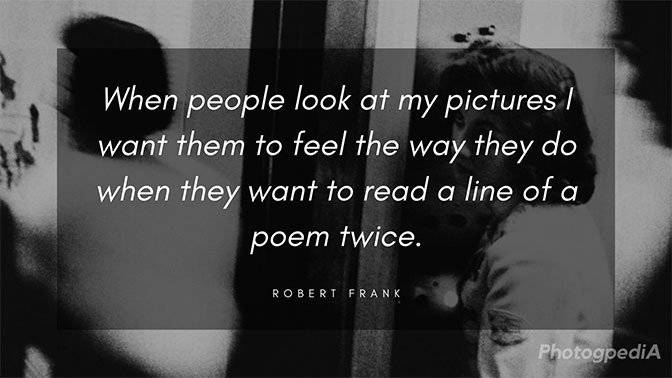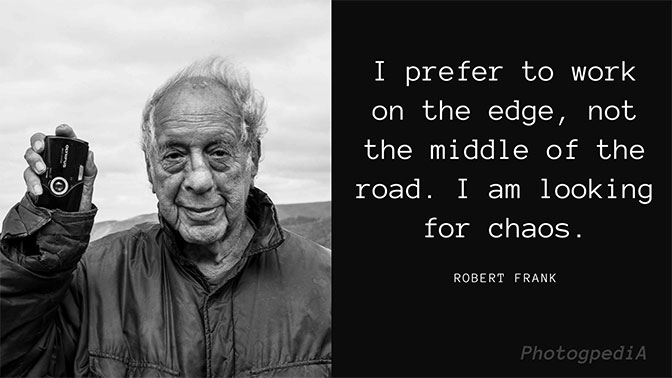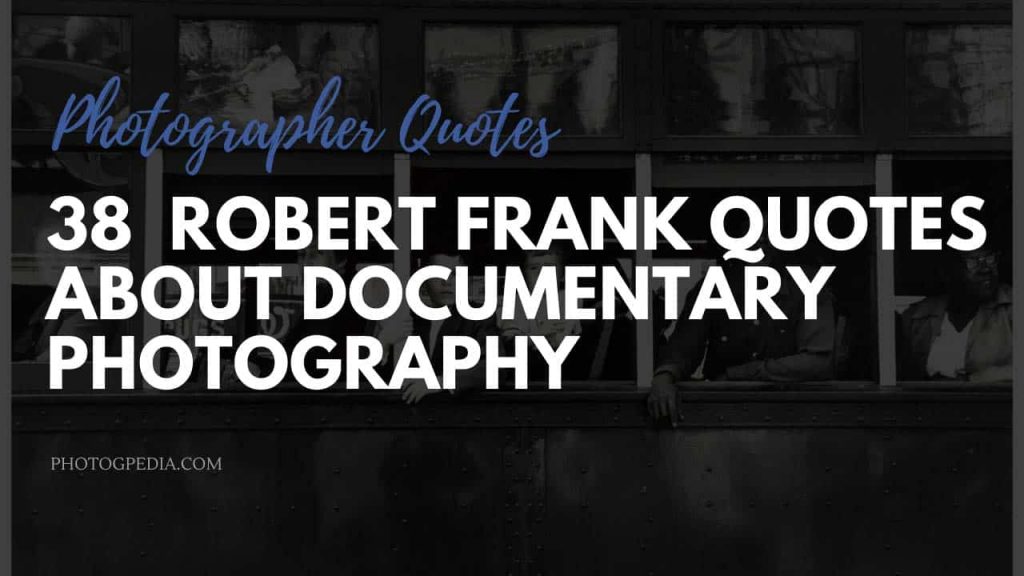Looking for the best Robert Frank quotes? Then you’ve come to the right place. Below we’ve compiled a list of 38 quotes from the legendary photographer behind The Americans which are guaranteed to inspire, motivate, and help take your photography to the next level.
Robert Frank Quotes
The eye should learn to listen before it looks.
I am always looking outside, trying to say something that is true. But maybe nothing is really true. Except what’s out there. And what’s out there is constantly changing.
I am a hunter, I hunt for pictures. I’m not a verbal man. I have nothing to reveal. It’s all in the work, I hope.
Photographs immediately make everything old.
Black and white are the colors of photography. To me they symbolize the alternatives of hope and despair to which mankind is forever subjected.
When people look at my pictures I want them to feel the way they do when they want to read a line of a poem twice.

Frank on the Work
After the success of The Americans, I didn’t want to repeat myself, and so you keep looking for something. And it continues, even when I go back to my old stuff. So this search is something more interior, related to my sentimentality.
I always say that I don’t want to be sentimental, that the photographs shouldn’t be sentimental, and yet, I am conscious of my sentimentality.
[After The Americans] I put my Leica in a cupboard. Enough of lying in wait, pursuing, sometimes catching the essence of black and white, the knowledge of where God is.
I guess I got where I wanted to get, but it didn’t turn out to be the place I hoped it would be. I’m an outsider, still.
I envy [my wife’s] freedom to sit down in front of a blank page with no machine to get in the way. That is freedom. Photography is not freedom.
I’ve never been successful at making films, really. I’ve never been able to do it right. And there’s something terrific about that. There’s something good about being a failure – it keeps you going.
It’s nice how film survives. It’s not the way photographs are. It’s still alive. A photograph is just a memory.
You do your work as a photographer and everything immediately becomes past. Words are more like thoughts; the photographer’s picture is always surrounded by a kind of romantic glamor – no matter what you do, and how you twist it.
I wished my photographs (the old ones) would move – or talk – to be a little more alive. But I can’t talk for them. That’s why there’s so much written about photography today – by “experts”.
Above all, I know that life for a photographer cannot be a matter of indifference.
Modern Day Photography
[Taking photographs is] almost embarrassing, everyone does it, after all. And everyone has the pictures in their head already anyway, all more or less the same.
Contemporary photography is competent, often exquisite. It’s easy to look at, and I prefer it if it’s not in colour and not about whores in India or South America. The few photographs I’m trying to make show my interior against the landscape I’m in. At times I put in words: soup, strength, fate, blind.
There are too many images, too many cameras now. We’re all being watched. It gets sillier and sillier. As if all action is meaningful. Nothing is really all that special. It’s just life. If all moments are recorded, then nothing is beautiful and maybe photography isn’t an art anymore. Maybe it never was.
The kind of photography I did is gone. It’s old. There’s no point in it anymore for me, and I get no satisfaction from trying to do it. There are too many pictures now. It’s overwhelming. A flood of images that passes by, and says, “Why should we remember anything?” There is too much to remember now, too much to take in.
Documentary Photography
Of all the photographs in The Americans, I think there were only two or three photographs where I did talk to the person, but most of the time I was completely silent, walking through the landscape, through the city, and photographing and turning away. Well, that is my temperament, to be silent, just looking on… What I liked about photography was precisely this: that I could walk away and I could be silent and it was done very quickly and there was no direct involvement.
My photographs are not planned or composed in advance, and I do not anticipate that the onlooker will share my viewpoint. However, I feel that if my photograph leaves an image on his mind, something has been accomplished.
Photography can reveal so much. It’s the invasion of the privacy of the people. I felt like a detective or a spy. Yes! Often I had uncomfortable moments. Nobody gave me a hard time because I had a talent for not being noticed.
I have been frequently accused of deliberately twisting subject matter to my point of view. Above all, I know that life for a photographer cannot be a matter of indifference. Opinion often consists of a kind of criticism. But criticism can come out of love. It is important to see what is invisible to others – perhaps the look of hope or the look of sadness. Also it is always the instantaneous reaction to oneself that produces a photograph.
I speak of things that are… everywhere – easily found, not easily selected and interpreted… a town at night, a parking lot, a supermarket, a highway… advertising, neon lights, the faces of the leaders and the faces of the followers, gas tanks and post offices and backyards.
I think I always had a cold eye. I always saw things realistically. But, it’s also easier to show the darkness than the joy of life. Life is not beautiful all the time. Life can be good, then you lie down, and stare up at the ceiling, and the sadness falls on you. Things move on, time passes, people go away, and sometimes they don’t come back.
I don’t ever think that I have gone far enough. I would like to reveal more… to push further… to show with more knowledge of what I photograph. To get people to trust me more in the way that I photograph them…
[on Photographic truth] Well…you know, tomorrow I might answer the question differently. But I think it means that I would like to talk or show things that I really know about. It would be more truthful to talk about people that I know very well. For instance, I wouldn’t go to Indonesia and photograph people or whatever. Not today, at least.
The truth is somewhere between the documentary and the fictional, and that is what I try to show. What is real one moment has become imaginary the next. You believe what you see now, and the next second you don’t anymore.
Robert Frank Quotes for Better Photography
There is one thing the photograph must contain, the humanity of the moment. This kind of photography is realism. But realism is not enough – there has to be vision, and the two together can make a good photograph.
When someone becomes aware of the camera, it becomes a different picture.
I love mistakes in photography. Sometimes they work.
The beginning – full of joy – energy for intuition. I learned to treat intuition as a trusted friend… on the road and inside me and in the darkroom.
Words are more thoughts; the photographed images always ends up having a romantic gloss about it – no matter how I try to avoid it.
It’s not the decisive moment. It’s not the beginning or end. It’s the middle. It’s more like a question
A message picture is something that’s simply too clear.
To produce an authentic contemporary document, the visual impact should be such as will nullify explanation.
I prefer to work on the edge, not the middle of the road. I am looking for chaos.
Robert Frank Quotes

What’s your Favorite Robert Frank Quote?
Have a favorite Robert Frank quote from the list? Let us know in the comment section below.
Don’t forget to bookmark this page, or print it out, and refer to it next time you need some inspiration. Also, don’t forget to share it with others through the usual channels (social media, forums, websites, etc).
Looking for more words of wisdom from master photographers? Visit the quotes section of Photogpedia for more great photography quotes.
More Quote Articles:

